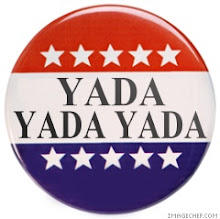I'm probably repeating myself by warning you that a sales pitch insisting that the item or idea or information you're selling is something someone doesn't want you to have or to learn about is a marker for hokum and perhaps outright fraud. Similar marketing techniques include warnings that you must get this or read that or go to the website "before they ban it" or that scientists, or historians or doctors or liberals are hiding the real truth from you about things like magic beans or some dietary trick that will block the effects of eating ten thousand calories a day -- or that some common ingredient is making you sick or pumping you full of obscure 'toxins' you can only get rid of if you buy my book.
Such marketing, if you can call it that, is so pervasive that it might seem as though the truth about most things has been hermetically
encapsulated in an impenetrable shell of propaganda: websites, infomercials and advertisements designed to misinform and mislead for profit. We recognize some of it, tolerate much of it as just hyperbole and humor, but sometimes too much flim flam will send you to the slam.
Kevin Trudeau, whose Natural Cures "They" Don't Want You To Know About is a prime example of health and nutrition hokum, just found out the hard truth the hard way and will have ten years in Federal prison to meditate on life.
Do booksellers who feature and promote such books bear some responsibility for misleading millions into harming or at least neglecting their health? As far as I know there have been few cases like it. It seems to be a rarity and there are no end of fraudulent sales pitches for water "with a different, non-toxic hydrogen bond angle," bracelets and pendants "tuned to natural frequencies" and books that assure you it's only the gluten-containing bun on that triple bacon chili cheese megaburger with cheese fries making you sick and giving you "grain brain." Caveat Emptor after all, is part of the Tea Party Utopian dream where allowing anyone to cheat anyone else leads to liberty and justice for all -- and of course enforcing any kind of truth in advertising law would run up the debt and cost jobs and place an unnecessary regulatory burden on business.
After all, if we started going after scam artists, perpetrators of fraud and lie merchants we'd have no room to lock up the politicians.
Tuesday, March 18, 2014
Subscribe to:
Post Comments (Atom)


No comments:
Post a Comment